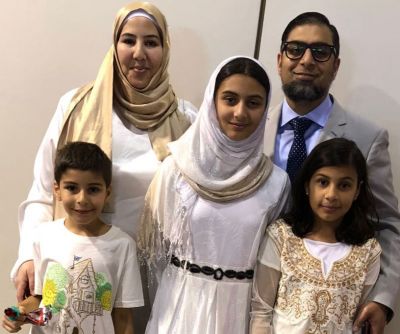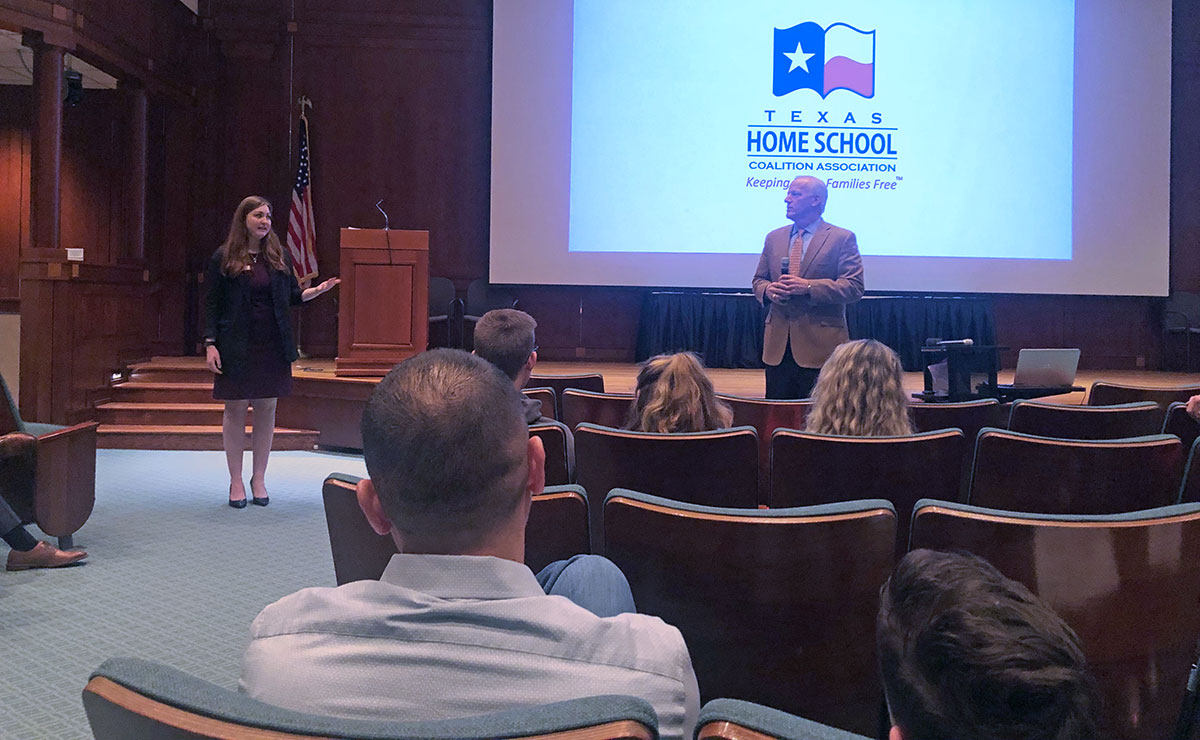By Shannon Kingsbury
The general public likely has a stereotype of homeschoolers, but if you attended one of THSC’s Called to Teach Homeschool Conventions this year, you may have noticed those in the homeschool community are a diverse bunch. In fact, homeschooling may be the only thing that some of us have in common. So how do people from all walks of life arrive at the decision to homeschool?
Wouldn’t you love to gather a diverse panel of families and hear the reasons that compelled them to homeschool? We would, so we did!
Meet the Campbell, the Gowayed, Olivera, Swanson, Kim and Anderson families. We put three questions to each of these families to get to the heart of their motivation for homeschooling. We hope that you will share this roundtable with friends, family, neighbors and others who think that all homeschoolers are alike.
What is your primary reason for homeschooling?
Campbell Family
The public school system was failing our children in terms of education and removing religion in terms of Christianity. A culmination of things in public schools made us realize that we can do better with homeschooling.

The Gowayed Family
Gowayed Family
We felt like homeschooling was the best option for meeting our son’s learning differences (ADHD and dysgraphia). There’s nowhere else to get one-on-one curriculum and customize your student’s education. We’re also committed to keeping our kids out of a secular education for a religious basis. Homeschooling is a great solution to all of this. We plan to homeschool our older children in high school as well.
Olivera Family
My daughter was dealing with emotional problems and bullying at her high school. She didn’t want to go to school anymore and started cutting herself. (She also has ADD and dyslexia.) Eventually the school counselor told both of us that he could only take action if the bullying happened to her face. Then he told me that I needed to get her professional help at a psychiatric hospital, and I said no more! I dropped out of high school because I was being bullied, and I didn’t want that to happen to my daughter. I removed her from school and began homeschooling.
Swanson Family
For black children in public schools, it’s not going to be positive because a lack of resources and the curriculum available in public schools is not meant to make us strong people in any area of life. There’s a lot of inconsistencies in the way that children are treated racially in public schools, and that’s been documented—not just peer-to-peer but also regarding teachers and administrators.
Kim Family
Our kids learn faster, they learn more material, and they’re ahead of their peers in the same grades. Secondly, we are Christians and concerned with false worldviews. Recently, my son’s friend told him, “Guess what I learned in world history today? All white men are dangerous.” When my son told me that, I said, “You know what? I’m glad we got you out [of school].”
Anderson Family
I was a single mother and my daughter went to daycare from the age of 12 weeks. Then when she was four, I got a job working from home. A couple of months later, I got mail from the public school saying it was time to register her for four-year-old pre-K. I had just finally gotten the opportunity to stay home with her—there was no way I was going to send her off to school. Also, years before I ever had her, I had read a book about learning through play and it shaped my thinking about how education could be.
In what ways has homeschooling made the positive impact that you expected or hoped for?
Campbell Family
Homeschooling is a lifestyle, and one of our regrets is not having homeschooled our kids from the beginning. We’ve watched our kids grow in confidence, and their thirst for knowledge has gone way above average.
Gowayed Family
We noticed that his stress level decreased. His ADHD symptoms diminished considerably. He was just a happier kid. Ten minutes of reading a day one-on-one with me improved his reading by leaps and bounds! Seeing his love of learning increase is incredible, and we weren’t able to cater to his needs like that before.
Olivera Family
Now my daughter is always laughing and smiling. She loves the relaxed environment of homeschooling. She’s not cutting anymore; she’s not depressed. Our relationship has been strengthened. I always joke with my daughter: “Honey, when you go to college, make room, because I’m coming with you!”
Swanson Family
Our daughter is five, and she hasn’t been exposed to a lot of negative influences. I like the fact that she hasn’t had the negative effects of being in school yet.
Kim Family
The obvious impact is the knowledge level. My children are either at or above their grade levels in comparison to their public-schooled peers. We’re able to teach the kids manners. My children’s homeschooled friends all behave fairly well and that rubs off on my kids. They’d be picking up all sorts of bad habits in public school.

The Kim Family
Anderson Family
I loved having my daughter with me. I know that her education was so much more well-rounded than what she could have anywhere else. I loved that she could wake up naturally every morning and start the day unhurried. I loved that she could go to the bathroom whenever she wanted. She never had to sit in class with her tummy growling, waiting for lunchtime. She got to order her day and she was responsible for getting her work done. Plus, we had the freedom to travel and see the places we were learning about in history, and practice Spanish in Mexico. She learned life skills. And because she wasn’t exhausted every day, she had plenty of energy for extracurriculars like sports, scouting, dance, theater and more. She has a real appetite for experiencing new things and reading, and I know that she will be a lifelong learner.
What words of advice do you have for other parents who might want to homeschool for the same main reason that you started homeschooling, but haven’t yet decided to do it?
Campbell Family
Doubt and fear about it is normal. Just do it! Go to a homeschool convention, grab a mentor, embrace the doubt, embrace the fear and overcome it by jumping head-in. Only your family can define what homeschooling should look like for your family. God planned for you to be your child’s parent, so you’re not going to mess up God’s plan for your child.
Gowayed Family
Take baby steps and don’t let the magnitude and resources overwhelm you and make you decide not to homeschool. Honestly, if I can do it, you can do it! I used to think that homeschoolers were a little kooky and that I would never do it! Have the confidence to instill a love of learning in your child.
Olivera Family
Research curriculum and programs. There is so much available. Look for homeschool groups on the internet and social media. Talk to your kids about what their expectations are for homeschooling. Homeschooling is flexible: I’m a single mom and I work around my schedule to homeschool. My mother helps us a lot too.

The Olivera Family
Swanson Family
I made two lists about the pros and cons of homeschooling and the pros and cons of public schooling. Make lists comparing and contrasting the two, and if the list is heavily skewed toward the homeschool side (like mine was), you as a parent would naturally want what is in your child’s best interest.
Kim Family
Don’t be intimidated by what appears to be a lot of work, because once you start homeschooling, it’s rewarding and can be fun as well. Find your routine and it’ll be like second nature to you.
Anderson Family
When my daughter was in daycare, I was neck-and-neck with the daycare to be the number one influence in my child’s life. I didn’t want to compete against the public school system for that place of honor. My daughter and I have a very special bond and, in large part, I attribute that to homeschooling. Where there’s a will to homeschool, there’s a way. I found a way by becoming the caregiver to my grandparents. That lasted three years, but once I was determined to homeschool, my choices started to line up with that goal, and we were able to continue homeschooling even while I worked full time.
Like these families’ experiences, homeschooling has been rewarding for me. As a homeschool graduate, I can say that homeschooling molded me into the woman I am today. I wouldn’t trade my homeschooling years for any other education. Do you want to give your children a culture that sparks in them a love of learning? Visit THSC.org/how-to-homeschool to find the next steps in your homeschool journey!
The Changing Demographics of Home Educators
The Coalition for Responsible Home Education (CRHE) collects data on homeschooled students once every four years.
The data from CRHE’s 2016 survey found that from 2012 to 2016, the number of white homeschooled students decreased slightly while the number of Hispanic homeschooled students increased.
The survey also found that “The rise in the number of students being homeschooled by parents who have not completed high school or a GED is consistent … in 2012, 11% of homeschooled students fell into this category; in 2016, 15% did.”
Homeschooled students also are more likely to live near or below the poverty level in comparison to other students, although a majority of homeschooled students live in two-parent households (only one in five homeschooled students lives in a single-parent household, compared with one in three students across all types of education).
What does all this mean? That homeschooling families are now a very diverse group. Families who were unlikely to homeschool a decade ago are doing so now. With many curriculum options available in all price ranges, various backgrounds are no longer barriers to homeschooling.
African-Americans and Homeschooling
A 2015 study by Brian Ray found that the motivation for African-American parents to homeschool aligns with most other homeschool families’ reasons and occasionally for a focus on teaching black culture and history to their children.
Ray also reports that “The average reading, language, and math test scores of these black homeschool students are significantly higher than those of black public school students … and equal to or higher than all public school students as a group”
Joyce Burges of National Black Home Educators (NBHE) says that “homeschooling has grown among African-Americans by at least 20 percent. Specifically because they feel that black boys are moving along that ‘prison pipeline’ beginning at nine years old. They’re assessing them based on certain tests in the third grade [to see if] this child is a candidate for prison. It’s basically targeting African-American boys. I hear that all the time.” She says that is a conversation that many African-American homeschool families are having. “We’re seeing more and more black families come to homeschooling because they feel like their little boys are being targeted in predominantly white schools.”
Burges says that NBHE serves families of all races and religions and is one of the organizations currently working with G Suite for Education (which is used in traditional school settings). She says that it will “open up the doors for more families to homeschool.” She plans to look into categorizing curriculum using G Suite for Education to support African-Americans and other families who are homeschooling. Although NBHE’s target group is African-Americans, G Suite for Education is global and will be a good education resource to all types of families. “I’m all about integrating the traditional education with technology. I think the G Suite will be a great tool for the new millennial generation that is homeschooling.”
Burges says that she thanks God for the lifeline of homeschooling. She says that homeschooling “is all that people had in the beginning [for education]; so we’re just returning to our roots.”
Visit NBHE.net for more information about NBHE and its work with G Suite for Education.
Mentoring: A Homeschooling Essential
A secret to staying the homeschooling course is to have a solid counselor to whom you can turn for wisdom.
Chyrece Campbell says: “Go to a homeschooling convention and grab a mentor. Get to know someone that’s been doing it for a long time. Often, you have a picture-perfect dream of what homeschooling is like. But homeschooling is like a recipe; anybody that likes spaghetti will tweak the recipe to her family. And that’s what homeschooling is; there will be tweaks to the curriculum or process for your family, and no two families will have the same recipes. And a mentor can give you those words of encouragement [for tweaking]. A mentor can tell you that it’s okay to have that crying break in the bathroom so that you can eat a Snickers bar, and then you come out and re-engage with your kids and be that encouraging light for them!”
Getting connected to a local group is also a great way of finding a mentor. Find a THSC Partner Group near you.










